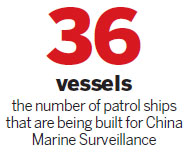Orders by maritime agencies offer beacon of light for struggling sector
The demand for surveillance ships in China has picked up significantly in recent months, as the country aims to equip one of its major maritime law enforcement bodies with more vessels.
|
 |
As the global shipbuilding industry endures one of its toughest spells in years, at least eight new orders for maritime surveillance ships have been secured by Wuchang Shipbuilding Industry Co Ltd, a subsidiary of China Shipbuilding Industry Corp, China Securities Journal reported on Monday.
The progress echoed an earlier statement from Liu Cigui, head of the State Oceanic Administration, which said that 36 patrol vessels are being built and will be put into operation within the next two years by China Marine Surveillance, the bureau's maritime law enforcement agency.
The agency has more than 400 vessels and more than 10,000 officers to safeguard China's sovereignty and maritime interests, he said.
Last year CSIC set out to strengthen some of its main subsidiaries, including the Wuchang shipyard, through a private placement from which it planned to finance the development of surveillance ships, according to a research note by China International Capital Corp Ltd.
The company has since gotten a head start on its competitors by expanding its portfolio into designing specialized vessels, including scientific research ships, engineering ships and surveillance ships, a niche segment that will fuel growth, the report said.
Six Chinese surveillance ships started patrolling the waters around China's Diaoyu Islands on Friday amid ongoing tension sparked by Japan's "nationalization" of the islands.
Three of the operating vessels were built by the Wuchang shipyard, including the 3,000-ton-class Haijian 50, the largest patrol ship in China Marine Surveillance's East China Sea fleet, according to China Securities Journal.
Compared with the more commonly used 1,000-ton-class patrol ships, Haijian 50 is equipped with China's most advanced marine technology and is capable of accommodating the country's Z9A helicopters, said Liu Zhendong, head of the East China Sea fleet of China Marine Surveillance, during the ship's maiden voyage in late 2011.
It has a maximum speed of 18 knots (9.26 meters per second) and can withstand level-12 typhoons (on a scale of 1 to 12), according to reports from China Central Television.
According to Clarksons Plc, the global shipping services provider, the Haijian 50 accounted for 15.4 percent of CSIC's domestic business in 2011.
The company has already reported half-year net profits of 2.57 billion yuan ($407 million), outperforming rivals and market expectations - impressive given that the industry is mired in its steepest earnings slump in three years.
Maritime surveillance ships are not for military use because they don't carry firepower or heavy weapons, but they differ from other civilian vessels in their role of protecting national territorial rights at sea, said Liang Zhiyong, an industry analyst at China Shipbuilding Economy Research Center under the CSIC.
He said more Chinese shipyards are expected to look at non-shipping sectors in the future to revive growth, such as energy transport and ocean engineering.
Everbright Securities Co Ltd has forecast a 5.01 percent growth in CSIC's net profits in 2012, and a 8.6 percent growth in 2013. By the end of 2015, it suggests energy transport will have superseded shipbuilding as its top business unit.
